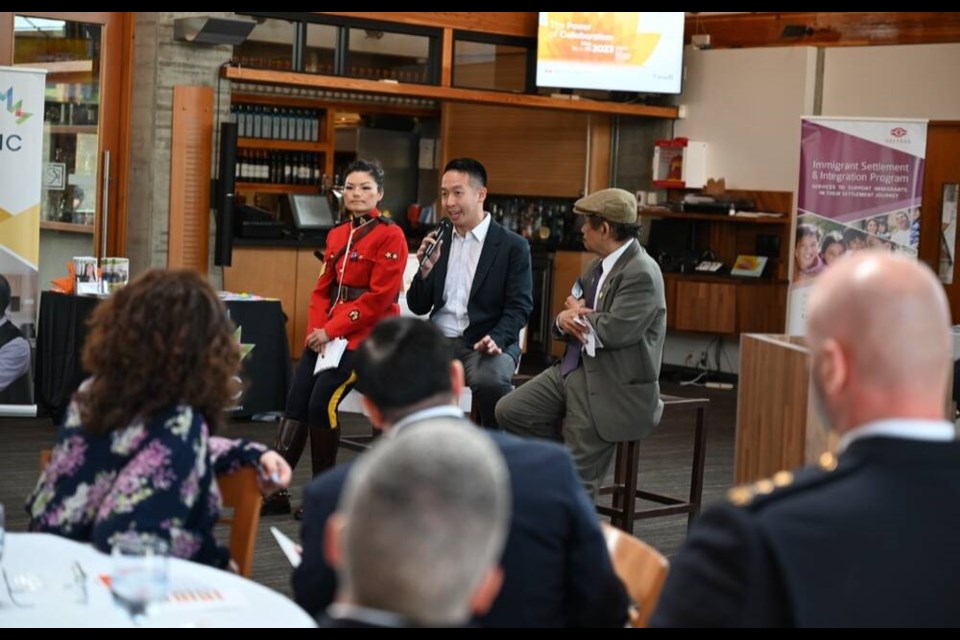In 2020, when the world was grappling with the coronavirus (COVID-19), there was another virus spreading: anti-Asian hate.
Videos surfaced — of a 84-year-old woman being tripped in Metrotown and then of a 93-year-old man assaulted in Vancouver’s Chinatown — unfortunately, it didn’t end there. In the next couple of years, anti-Asian hate spiked.
In 2021, Burnaby saw a 350 per cent jump in such offences during the first year of the COVID-19 pandemic. “Go back to your country” and “you don’t belong here” were increasingly heard.
Three years after the Metrotown hate incident, BC RCMP Staff Sgt. Frank Jang was working late night when the video of the assault resurfaced. “It was weighing heavily on my heart,” he said. “I wondered if I can do something about this.”
Around the same time, when an email came through calling for applications for a grant from the Department of Justice Canada in observation of Victims and Survivors Crime Week, Jang jumped on it and planned a community event, which attracted 140 members of the community and coincided with Victim and Survivors Crime Week and Asian Heritage Month.
The goal of the May 17 forum held in Burnaby was to highlight the importance of reporting hate crimes.
Numbers don’t paint the whole picture, Jang said. Hate crimes are vastly underreported, partly because of shame, he explained. But victims shouldn't stay silent, he said.
“You are worth it. Everyone is worth hearing their voice. And what happened to you is worthy to be reported."
Doris Mah, a Burnaby resident and founder the B.C.-based Stand With Asians coalition (SWAC), said it’s important to raise awareness among the public.
"If you experience racism, discrimination and hate crime, you need to report it,” Mah said. "We should be proud of who we are. We don’t have to be shameful, let alone this is a crime that’s committed against us.”
Jang said that while there was a lot of attention to hate crimes at the height of the pandemic, people are still affected by it. “They walk the streets, it’s their neighbourhood, and somebody comments that they don’t belong, that they need to go back to 'their country' and is now a prisoner in her own mind, in her own neighbourhood,” Jang said.
As a police officer of Asian descent, he said, he wants hate crimes to be reported and investigated, and for the perpetrator to be held accountable.
But it’s easier said than done — especially with the ambiguity in what constitutes a “hate crime,” according to Mah.
Criminal Code provisions
There is no unified definition of hate crimes in the Criminal Code, she said.
Hate crimes are defined differently in different parts of Canada — for one, Toronto defines a hate crime as “a criminal offence committed against a person or property that is based solely upon the victim’s race, religion, nationality, ethnic origin, sexual orientation, gender or disability,” which is more restrictive for reporting than Ottawa, which defines hate crime as “a criminal offence committed against a person or property which is motivated by the suspect/offender’s hate/bias against a racial, religious, ethnic, sexual orientation or disability group.”
This ambiguity, Mah suggested, causes mismatched hate-crime statistics.
“This is why we need to have a criminal court reform to tackle hate crime,” she said. “The police collected the data, [but] when it comes together, it’s not accurate.”
However, Jang said, “calling somebody a racial slur is not a crime yet in the Criminal Code of Canada, but it’s equally problematic because it compromises the safety of the victims.”
“But [even] in that case, we need to know about that incident. It doesn’t matter if it qualifies as a crime. If it makes somebody feel unsafe in their community, we need to know about that. Because hate crimes, hate incidents, it’s not just a police problem. It’s a community problem,” he added.



